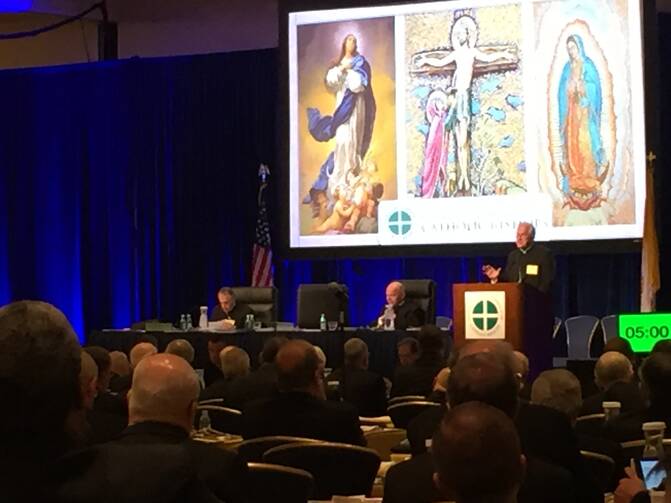At the the U.S. bishops' meeting in Baltimore, opening speeches hewed to familiar themes: protecting and encouraging Catholic families, maintaining Catholic identity and expressing a continuing concern over religious liberty in a rapidly secularizing world. Papal Nuncio Archbishop Carlo Maria Viganò warned of a “critical point now in the challenges to family life in our Western world.”
The archbishop focused his comments on concerns that Catholic education prepare children for lives as faithful parents, models for a secular society, and the strengthening of Catholic identity at institutions of higher learning. “A solid Catholic family is the very first school for learning good and faithful parents are always the best of teachers, they form a domestic church,” he said.
“The new evangelization should find a new strength just as it did in the first evangelization,” he said, “solid and unwavering in its commitment to truth.” He warned it “cannot fall prey” to an increasingly secularized, even “increasingly pagan civilization.”
He noted a need for bishops to give particular attention and care to Catholic education and its institutions, “so that they might regain the luster of their true identity that has shone forth in the past."
“Catholic institutions and universities should be encouraged to be faithful to the title of Catholic that they bear,” he said, so their students can take their rightful place in the world “to be the true Catholic family god intends them to be.”
“Our students should be taught how to pray, how to become familiar with Christ.” They should be taught, he added, how enriching it is to encounter the poor, the sick, the refugee.
In his presidential address, Archbishop Joseph E. Kurtz of Louisville, President of the U.S. Conference of Catholic Bishops, seconded some of the concerns about family life in the United States that Archbishop Viganó raised. He urged the U.S. bishops to take the words of Pope Francis to heart and remain a strong, pastoral presence in their dioceses, but focused his concerns on the expression of the U.S. church in the wider society.
Noting the church’s extensive presence in virtually every corner of U.S. life, he said, “Our works of mercy are responding to the heartbreaking crises and challenges in our world. The draft introductory note to Faithful Citizenship, which we will consider tomorrow, sums up these challenges: we face the ongoing destruction of over one million innocent human lives each year by abortion; the redefinition of marriage; the excessive consumption of material goods and destruction of natural resources; the deadly attacks on fellow Christians and religious minorities throughout the world; the narrowing of religious freedom, which threatens both individual conscience and the freedom of the Church to serve; economic policies that fail to prioritize the poor; a broken immigration system and a worldwide refugee crisis; wars, terror, and violence that threaten every aspect of human life and dignity.”
Archbishop Kurtz said, “Our calling is to be present in this world, in the very places where people are hurting the most. Our ministries are designed to give people hope, to walk alongside them, to provide practical help, but also to show them the way to Jesus and the transformative power of His love and grace. This is accompaniment at its best.
“What a great tragedy it will be if our ministries are slowly secularized or driven out of the public square because of short-sighted laws or regulations that limit our ability to witness and serve consistent with our faith.”
Catholic families was also a focus of Archbishop Kurtz’s opening address. “Media coverage of the Synod,” he said, “dutifully reported the debates surrounding true and lasting pastoral care for those families distant from the church.
"What was under-reported was the wide agreement on the priority of calling forth, properly forming and supporting families who faithfully and often heroically witness to their family life, inspiring others in the church and society. Families who accompany other families—who serve as mentors—may be the greatest fruit of the Synod process.”
He added, “Important in calling forth such witness is our efforts to promote the beautiful vision of self-giving love in marriage. As we as a body take up the formal statement on the destructive effects of pornography in our age, we have the great opportunity to lift up the beauty of God’s plan for human sexuality.”








